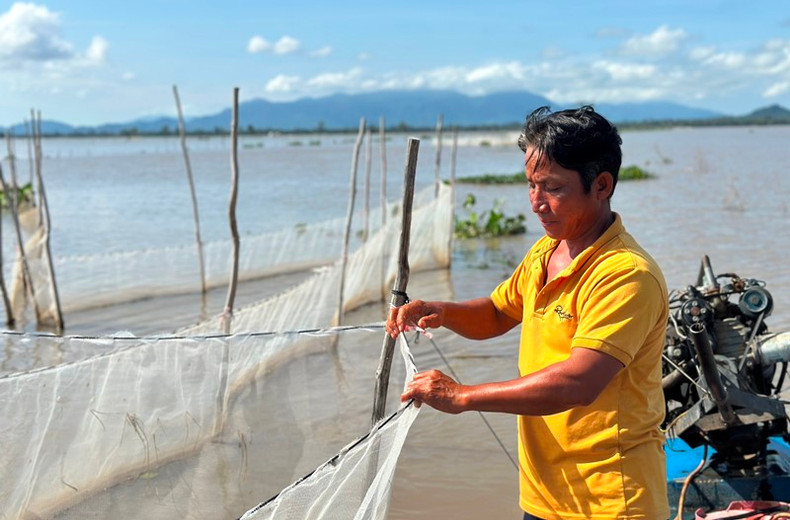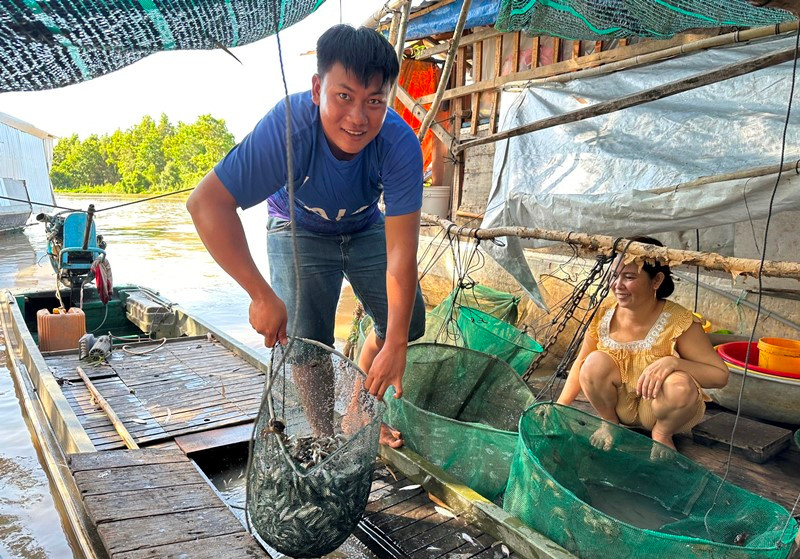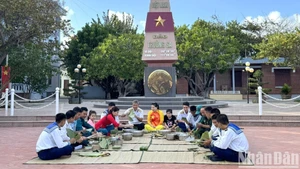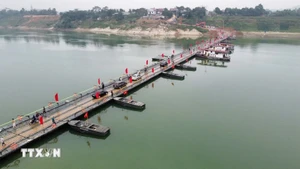Normally taking place between August and November, flood season is the most expected time among farmers in the Mekong Delta.
With more than 40 years of experience setting fishing net for catching ‘linh’ fish, 64-year-old Le Van Thu of Thanh My Tay Commune, Chau Phu District, An Giang Province, is very familiar with the natural flows of water in the flood season.
He said that after the Doan Ngo Festival, which is celebrated on the fifth day of the fifth lunar month, the water in the rivers and canals changes from green to a brick red colour. Floodwaters from the upstream of the Mekong River pour into the Mekong Delta upstream, overflowing several dikes, and it often takes several months to reach peak flooding season.
Pointing towards the fields in the border commune of Nhon Hung in Tinh Bien Town, An Giang Province, Thu said that is the "fishing ground" for his whole family during the flood season.
Over the past three years, from the start of the fifteenth day of the seventh lunar month when the floodwater begins rising, Thu and his sons leave their house and get into a boat upstream of the fishing ground.
Driving the boat, 42-year-old Le Van Tung, Thu’s eldest son, took us to experience how Mekong Delta farmers make a living on the flood season.
Along the banks of Tha La canal, farmers were dropping and lifting up their large fishing nets into the floodwater to catch fishes. The rice fields were now crowded with canoes, boats, and fishing nets.
 |
| The rice fields are crowded with canoes, boats, and fishing nets during the flood season |
Tung showed us the harvesting areas of his father and four siblings. According to Tung, each area is about 200m long, including 10 fishing nets, with each placed 200m apart. The total harvesting area of his family stretches more than six kilometres with about 300 fishing nets.
Every day during the flood season, his family members have to wake up at 3AM to set up the fishing nets, and they even have to hire more workers to finish the work before noon.
“My family alone has 32 fishing nets, which harvest from 60kg to 80kg of fish of all kinds every day, selling for about 600,000 VND to 1 million VND,” Tung revealed.
Meanwhile, 38-year-old Le Van Kinh, Tung's younger brother, said that he has spent 20 years following his father to make a living on the river.
Since getting married 14 years ago, Tung left his parent’s house and lived with his wife on a boat.
After more than half a day of diving in the floodwater, we harvested big bags of fish, which were then poured onto the boat to classify before selling to traders.
A ‘linh’ fish is bigger than a thumb, and can be sold for 17,000 VND/kg. Other types of fish are priced from 5,000 to 140,000 VND per kg based on their size and customers’ demand, Tung explained.
 |
| Le Van Tung checks the fishing net |
After bringing fishes into the boat, the men completed their mission of the day. Thu and his sons Tung and Mr. Kinh gathered at the roadside coffee shop for relax. The remaining tasks such as classifying and selling fish are all taken care of by their wives.
While observing the rapid flow of water, Thu assumed that the peak of fish harvesting season this year will fall on the 25th day of the tenth lunar month and the 10th day of the 11th lunar month.
“Before the 2000s, harvesting fish during the flood season brought good income which could help us live for a year. In those days, the fish were so vast that they were sold and priced in 20-litre barrels, not in kilograms like now,” Thu recalled.
During the flood season in the past, the whole village flocked to the fields and worked all night to harvest fish. Families with big number of members could harvest tens or even hundreds of barrels of fish. The fish were sold for money, or dried and fermented to keep as food for the whole family for the entire year.
However, water from the Mekong River has been decreasing in recent years in Delta, causing a decline in fishery resources and production losses, thus reducing the income of farmers.
















